Pskov is a unique city with a rich history. The number of architectural monuments per square meter clearly puts it in one of the first places among the sightseeing tourist destinations in Russia. Until the 16th century, it was the center of the free Pskov Republic - an independent state formation, where a form of medieval feudal democracy existed.
First of all, Pskov is notable for the fact that many religious and civil buildings of the 12th-16th centuries have been preserved here, which were not damaged during the Tatar-Mongol yoke. Cities located to the south fully felt its destructive power, but Pskov managed to partially preserve its historical heritage. Therefore, today tourists can admire the walls of the ancient fortress and ancient cathedrals.
What to see and where to go in Pskov?
The most interesting and beautiful places for walking. Photos and a short description.
- Pskov Krom
- Embankments of the rivers Pskov and Velikaya
- Dovmontov city
- Trinity Cathedral
- Towers of the Pskov fortress
- Pogankin Chambers
- Order chambers
- Chambers of the Menshikovs
- Churches and temples of Pskov
- Mirozh Monastery
- Snetogorsk monastery
- Monument Battle of the Ice
- Monument to the 6th company
- Kaverin Museum Two Captains
- Pskov Blacksmith Yard
- Museum Honey Farm
- Museum of Pskov Railwaymen
- Pskov Drama Theatre. A.S. Pushkin
- Olginskaya chapel and observation deck
- Mikhailovskoye Museum-Reserve
Pskov Krom
The Pskov Kremlin is an inimitable building. Its difference from the fortresses of Tver, Moscow, Smolensk and other Russian cities is that it was not influenced by Italian architecture. The fortification was built in a brutal, solid style, typical for the free Pskov Republic of the XIV-XVI centuries. In the past, Krom reliably protected the city from enemies. At one time it was one of the largest fortresses in Europe.
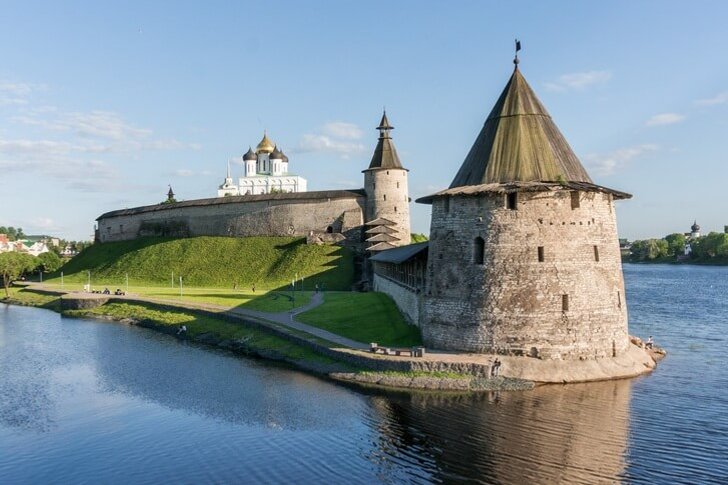
Address: Pskov Krom, Pskov, Russia
Opening hours: 09:00-20:00
Embankments of the rivers Pskov and Velikaya
The ancient settlement originated from the place where the Pskov and Velikaya rivers merge. Today, there is the historical center of the city with well-groomed embankments and walking alleys. The indestructible stronghold of the Pskov Krom stretches along the Velikaya. Pskov begins near one of the towers of the Lower Lattices, you can go to it through an arched hole in a powerful stone wall.
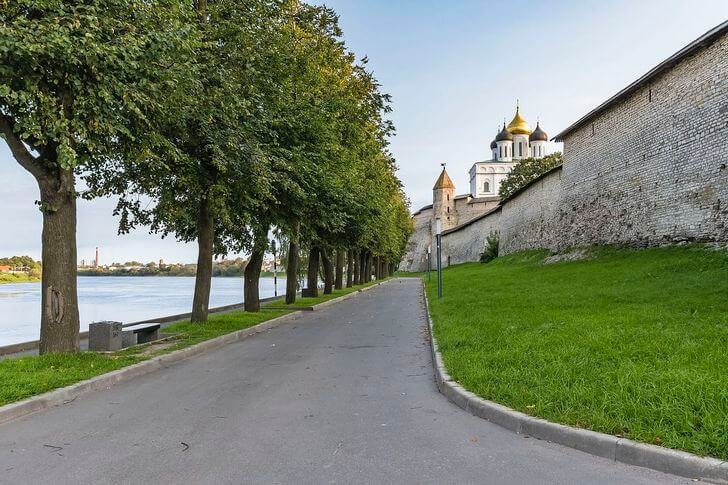
Address: Embankments of the rivers Pskov and Velikaya, Pskov, Russia
Opening hours: 24/7
Dovmontov city
A stone defensive building of the 13th century, erected under Prince Dovmont to further strengthen the Pskov Kremlin. It is believed that in the 9th century there were settlements of artisans. Ruins have survived to this day - the remains of the foundations of walls and temples, which were demolished and covered up in the 18th century as unnecessary, like other ancient buildings. The territory of Dovmontov city came to its final desolation by the 19th century.
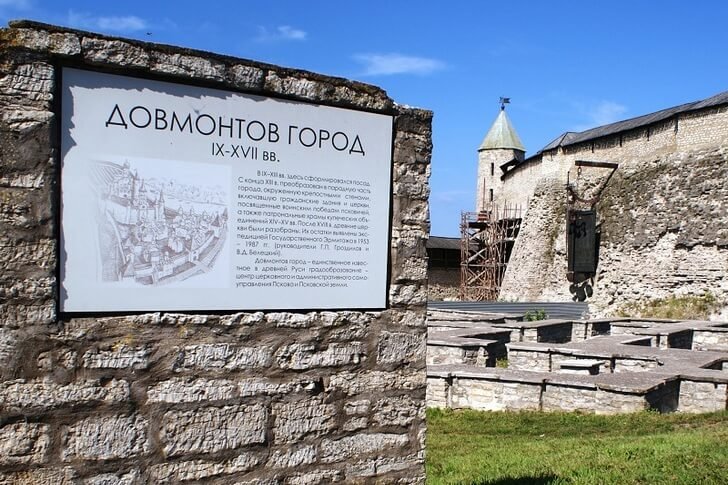
Address: Dovmontov city, Pskov, Russia
Opening hours: 09:00 - 20:00
Trinity Cathedral
Orthodox church of the 17th century, built in the style of Moscow architecture. The first cathedral on this site was erected in the 10th century by the will of Princess Olga. The building was wooden, it stood for almost 200 years until it died in a fire. The second church was built in 1188, but in 1363 it collapsed. The relics of princes Dovmont-Timofei and Vsevolod-Gabriel are kept in the temple.
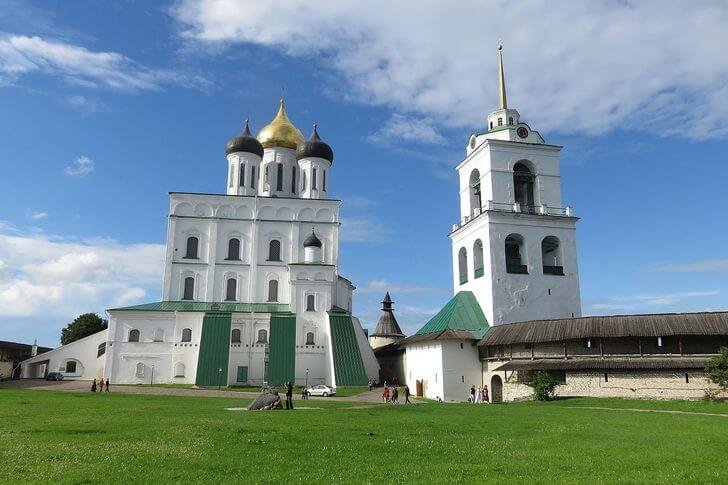
Address: Trinity Cathedral, Pskov, Russia
Phone: +7 811 262-76-02
Opening hours: 09:00 - 18:00
Towers of the Pskov fortress
The exact date of foundation of the Pskov fortress is unknown. This building is mentioned in the ancient Tale of Bygone Years. Stone towers to strengthen the defensive functions began to be erected only in the 15th century. Once there were 40 of them, far from all have survived to this day. Among the well-preserved buildings are Vlasievskaya, Rybnitskaya, Sredny, Vysoka, Ploskaya, Kutekroma and many others.
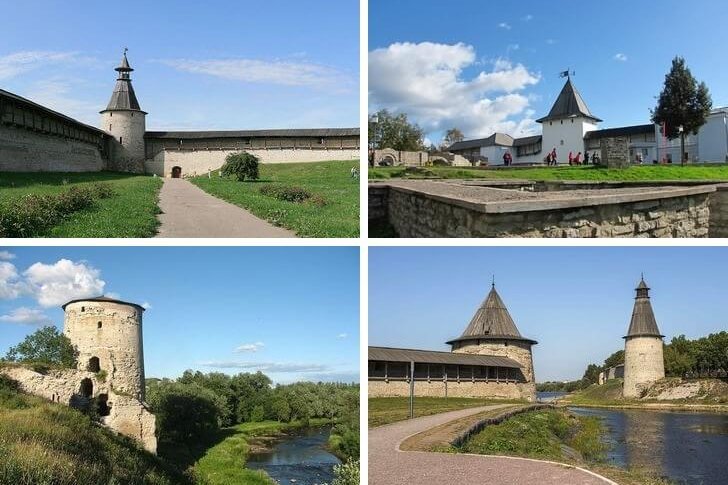
Address: Towers of the Pskov fortress, Pskov, Russia
Opening hours: 9:00 - 20:00
Pogankin Chambers
Residential and industrial building of the 17th century, built by order of the merchant S.I. Pogankin, who at that time was one of the richest merchants in the city. Today the complex is part of the Pskov Historical, Artistic and Architectural Museum-Reserve. It houses several interesting expositions, including a collection of paintings of the XIV-XVII centuries and a rich collection of silver.
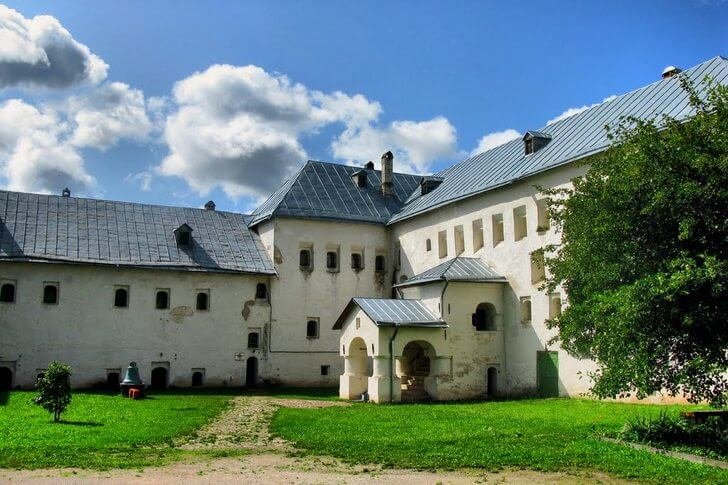
Address: Pogankin Chambers, Pskov, Russia
Opening hours: 09:00 - 18:00
Order chambers
Administrative building of the 17th century, the only building of this type that has survived to this day. The chambers are a powerful stone building with walls over 2 meters thick and a hipped metal roof. Until 1692, in their place was a wooden Prikaznaya hut, where the local, discharge, embassy, court and money "tables" - departments were located. Today, the chambers house the city cultural center.
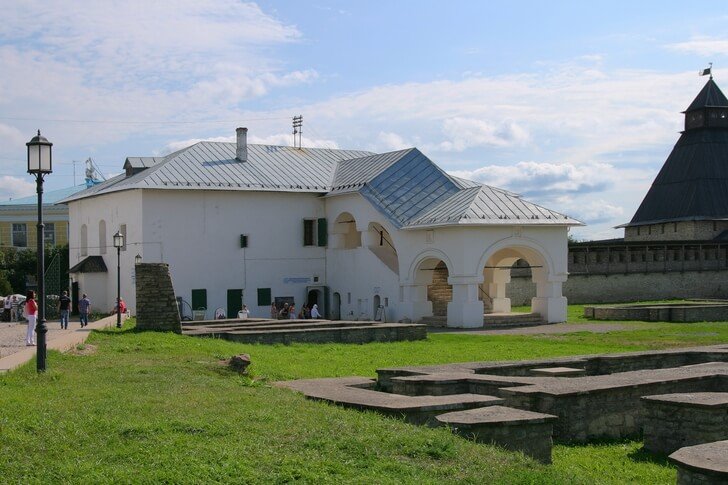
Address: Order chambers, Pskov, Russia
Opening hours: 09:00 - 17:00
Chambers of the Menshikovs
Residential stone building with three floors, built for the merchant Semyon Menshikov in the 17th century. Initially, it was five-story (two wooden levels were on top). At the beginning of the 18th century, as a result of a fire, almost the entire building burned down, the masonry of the walls was damaged, after which the Menshikovs sold the house and never lived in it again. Today, the completely restored chambers house the Pskov Gonchar Museum and other expositions.
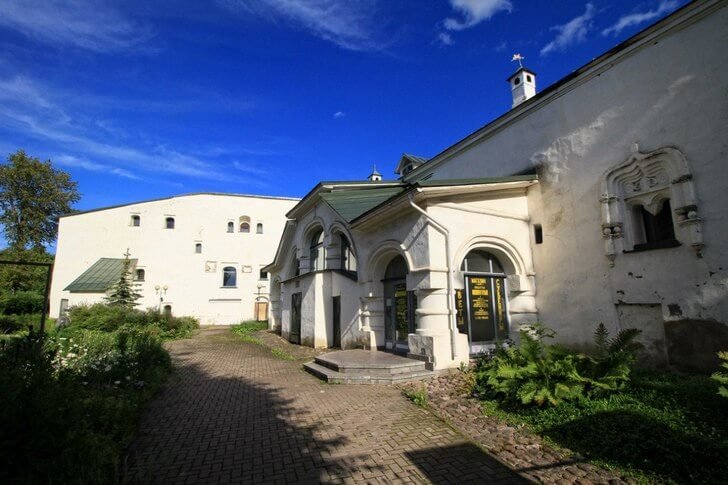
Address: Chambers of the Menshikovs, Pskov, Russia
Opening hours: 10:00 - 18:00
Churches and temples of Pskov
Religious buildings of Pskov are an important part of the architectural heritage of the city and the whole country. There are preserved churches of the XII-XV centuries, which is a rarity for Russia, since most of the ancient buildings did not survive the invasion of the Tatar-Mongols. Among the famous temples are the Annunciation and Trinity Cathedrals, the churches of St. Nicholas from Usokhi, Peter and Paul from Buy, Vasily on Gorka, Michael the Archangel from Gorodets.
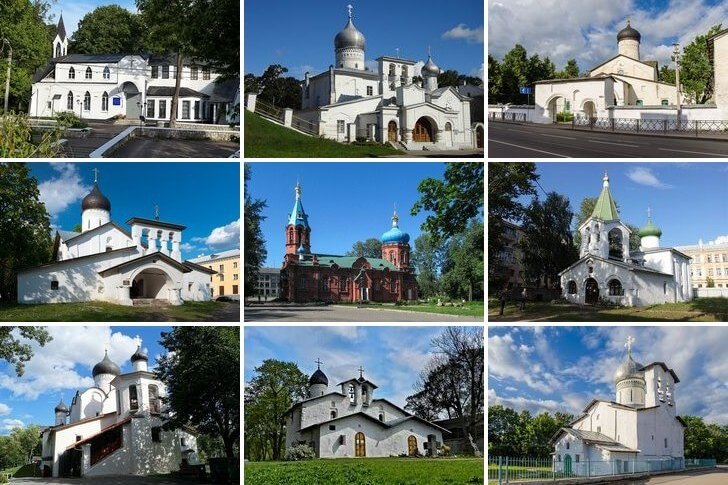
Address: Churches and temples of Pskov, Pskov, Russia
Opening hours: 09:00 - 17:00
Mirozh Monastery
Men's monastery of the XII century with well-preserved (and the only one in Russia) frescoes of the pre-Mongolian period. In the Middle Ages the monastery was the cultural center of Pskov. Under him, a library with a staff of scribes and an icon-painting workshop worked. The complex was repeatedly attacked and became a victim of natural disasters; in the 20th century it was closed. In 2010, the monastery passed into the possession of the Russian Orthodox Church.
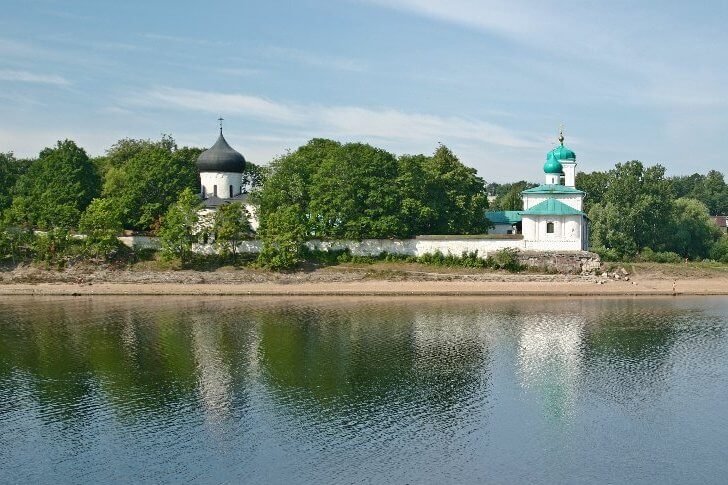
Address: Mirozh Monastery, Pskov, Russia
Opening hours: 08:00 - 18:00
Snetogorsk monastery
The female monastery of the XIII century, one of the oldest on the Pskov land (originally the monastery was male). The architecture of the complex is a mixture of traditional Russian styles from different eras. For such a long existence, he has seen many events: destruction, transformation, flourishing, decline and again - rebirth. In 1472, the Grand Duchess of Moscow Sophia Paleolog stayed here.
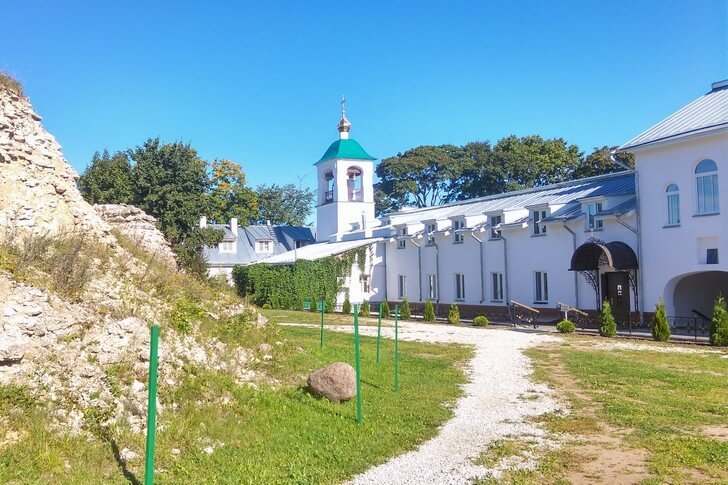
Address: Snetogorsk monastery, Pskov, Russia
Opening hours: 08:00 - 18:00
Monument "Battle of the Ice"
In memory of the historical events of 1242, when Western Christian orders made another attempt to seize the rich Novgorod and Pskov lands, already in the 20th century a monument was erected on Mount Sokolikha. The monument was erected in 1993, timed to coincide with its opening to the 1090th anniversary of Pskov. It consists of figures of Alexander Nevsky on horseback, a boyar in a ceremonial cloak and foot knights, frozen in full combat readiness.
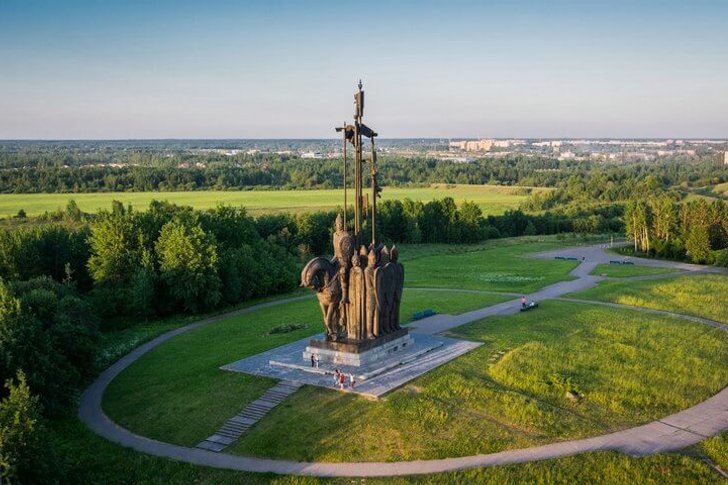
Address: Monument Battle of the Ice, Pskov, Russia
Opening hours: 09:00 - 20:00
Monument to the 6th company
The monument was erected in 2002 in the village of Cheryokha in memory of the feat of the soldiers of the 6th Airborne Company. During the Second Chechen War, they delayed the retreat of the militants in the Argun Gorge at the cost of their own lives. The monument was created by the Pskov sculptor A. Tsarik. It is a large parachute, which rests on a pedestal depicting a mountain peak.
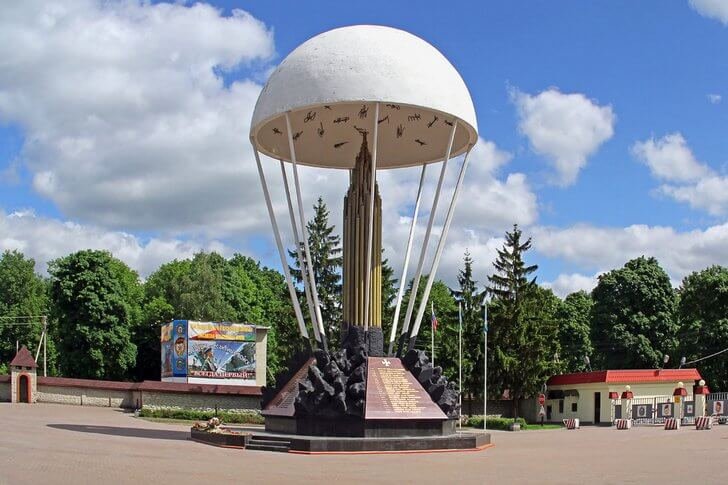
Address: Monument to the 6th company, Pskov, Russia
Opening hours: 09:00 - 18:00
Kaverin Museum "Two Captains"
The museum is named after the novel of the same name. The initiator of the creation was the regional children's library. The exposition is dedicated to expeditions and pioneers. It will be of interest to everyone who is interested in sea voyages, adventures and discoveries. Part of the collection covers the work of the writer V. A. Kaverin, as well as the history of the creation of his famous novel "Two Captains". In front of the entrance to the museum there is a monument to Sanya Grigoriev and Ivan Tatarinov, the main characters of the work.
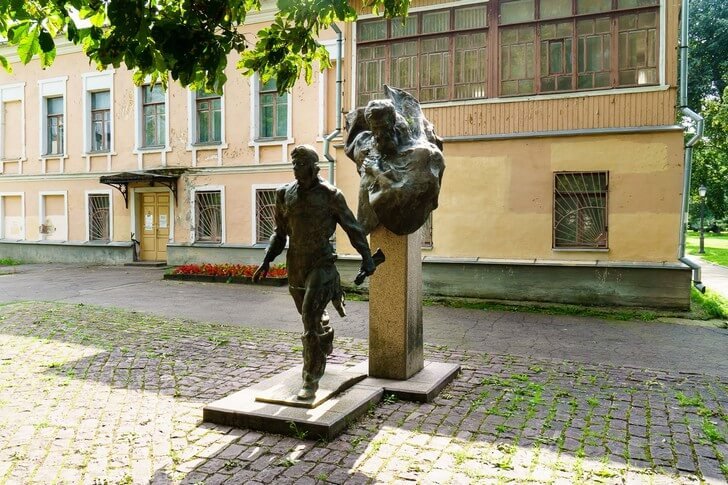
Address: Kaverin Museum Two Captains, Pskov, Russia
Opening hours: 10:00 - 18:00
Pskov Blacksmith Yard
A monument of civil architecture of the 17th century, which has survived almost completely unchanged to this day. It is also known as the Ksiondza House. The wooden parts of the building burned down during a fire in 1944, but the stone structures survived. After restoration, a museum and a blacksmith's workshop were opened on the territory of the house, where products of Pskov masters are demonstrated.
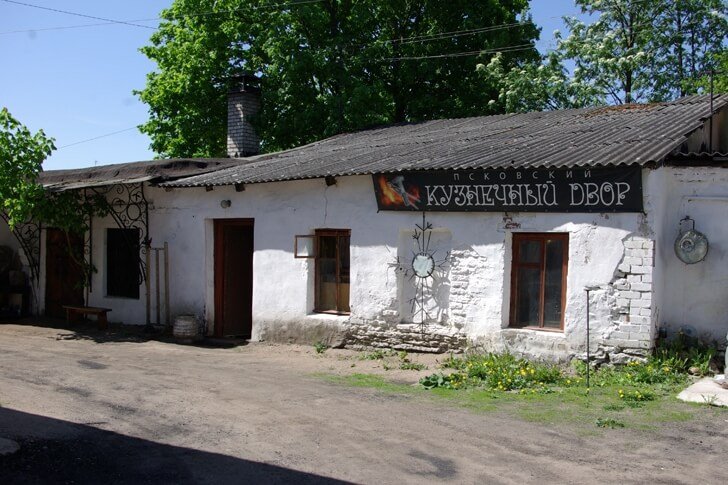
Address: Pskov Blacksmith Yard, Pskov, Russia
Opening hours: 09:00 - 18:00
Museum "Honey Farm"
Museum of beekeeping, which is located in the Pechora district, about 40 km. from Pskov. It was founded by beekeeper G. V. Glazov in 2002. The exposition is a collection of items of peasant life of the 19th-20th centuries, which includes dishes, elements of the interior of the hut, tools, handicrafts, as well as devices for collecting and storing honey: biostator hives, honeycombs, hollows.
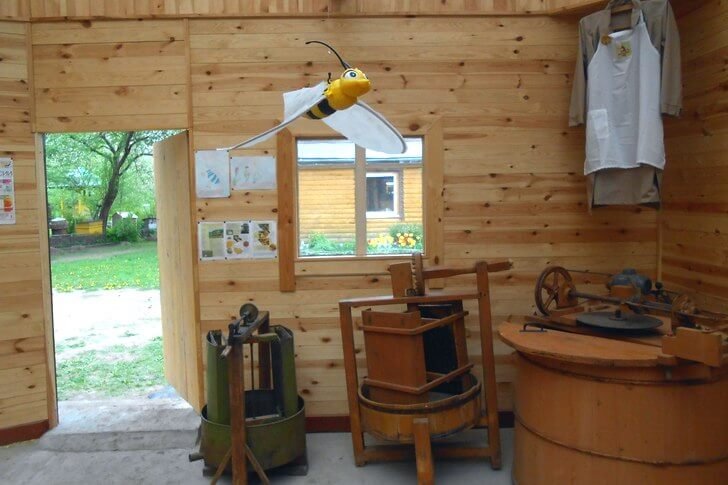
Address: Museum Honey Farm, Pskov, Russia
Opening hours: 09:00 - 18:00
Museum of Pskov Railwaymen
The museum is located in a building opposite the city railway station. Its exposition consists of objects that tell about the history of the emergence and development of the railway business in Pskov. The collection is housed in three rooms. Visitors can see interesting rare exhibits: repair tools of the 19th century, dummies of old tickets, candle lanterns, as well as learn about the peculiarities of laying tracks in different countries.
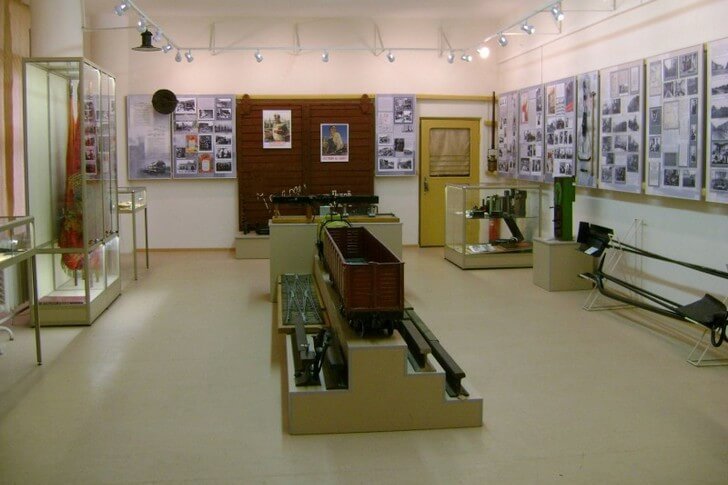
Address: Museum of Pskov Railwaymen, Pskov, Russia
Opening hours: 09:00 - 17:00
Pskov Drama Theatre. A.S. Pushkin
The construction of the stage began in 1899 in honor of the 100th anniversary of the birth of A. S. Pushkin. Funds were raised thanks to donations from citizens. Until the 1920s, the theater did not have a permanent troupe, so the actors changed from season to season. The first building was destroyed during the Second World War, but already in 1946 it was restored and theatrical performances resumed. In the period 2012–14 it has undergone extensive restoration.
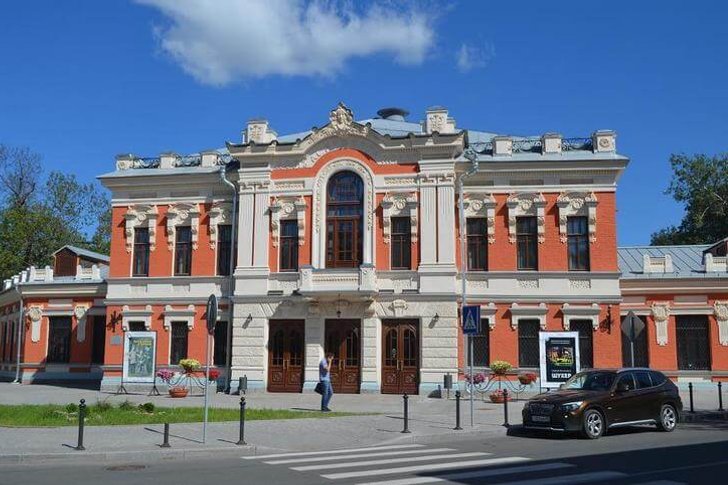
Address: Pskov Drama Theatre. A.S. Pushkin, Pskov, Russia
Opening hours: 10:00 - 19:00
Olginskaya chapel and observation deck
A small Orthodox church built at the turn of the 20th and 21st centuries on the banks of the Velikaya River. There used to be a chapel here, which was closed in the 1920s and demolished in the 1960s. The building is made in the traditional Russian architectural style, typical for the churches of the period of the Pskov Republic. The temple is located in the middle of a convenient observation deck from which you can admire the river and the opposite bank.
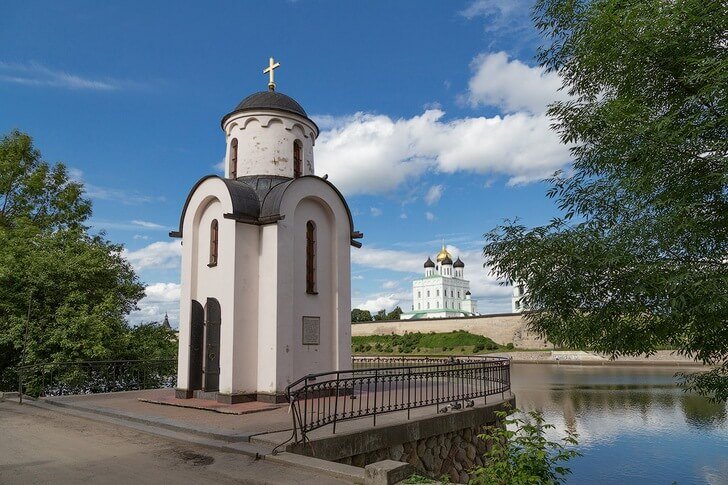
Address: Olginskaya chapel and observation deck, Pskov, Russia
Opening hours: 09:00 - 21:00
Mikhailovskoye Museum-Reserve
The memorial complex and a vast park area, located 115 km. from Pskov. The reserve is known for the fact that on its territory there is the grave of A. S. Pushkin and the Svyatogorsk Holy Dormition Monastery with the cemetery of the Hannibals-Pushkins. There are also several estates with parks, estates of the poet's relatives and friends, museums, remains of ancient settlements, picturesque natural meadows and lakes.
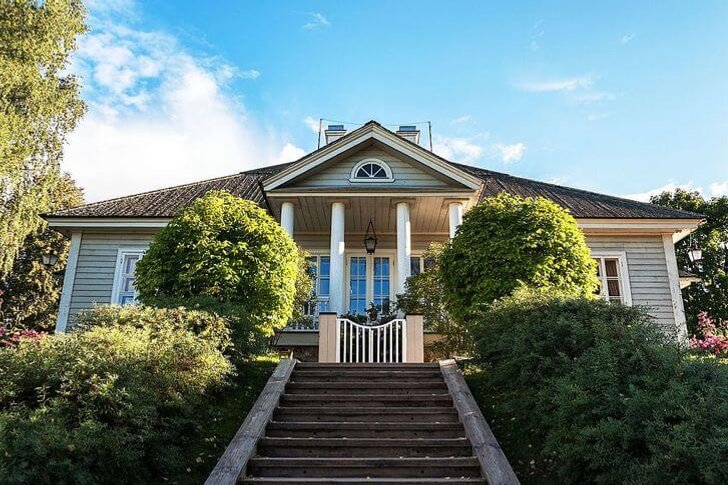
Address: Mikhailovskoye Museum-Reserve, Pskov, Russia
Opening hours: 09:00 - 18:00